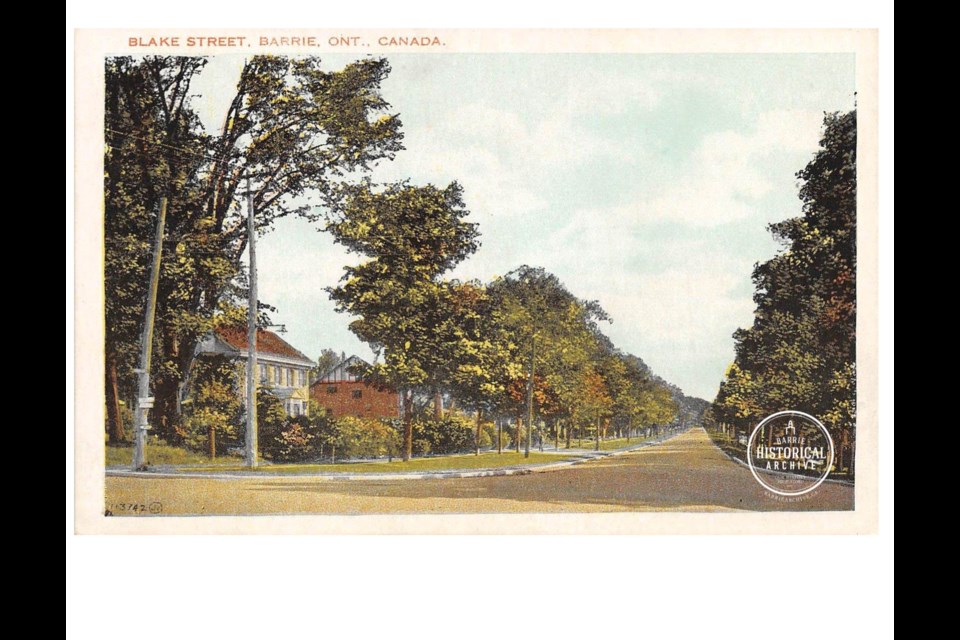In May of 1915, three ladies, all educators at Havergal College in Toronto, accepted an invitation to spend the Victoria Day weekend at the home of an acquaintance in Barrie.
They were immediately impressed by the town with the well-built houses along tree lined streets overlooking sparkling Kempenfelt Bay.
Without any hesitation, Ethel Elgood, Miss E.J. Ingram and Raina Shopoff all decided then and there that young women would benefit immensely from a first-class education in this setting and agreed to start a school.
During that same weekend, they shopped for locations had decided on the mansion house known as Ovenden before they departed again for Toronto.
At Blake and Dundonald streets, Ovenden was a large three-storey house with a vast porch and fine view of the lake. It had seen many balls, parties and social gatherings in the years it had housed members of the interconnected Strathy, Ardagh and Gowan clans.
It had also been the scene of the tragic death of John Alexander Strathy, who was shot at the front door by an unbalanced man in the winter of 1896.
With the 1909 death of H.H. Strathy, brother to John A. Strathy, the house fell to H.H. Strathy’s son, Gerard, as his widowed mother moved to Toronto.
Ovenden needed a new purpose.
By July 1915, Ovenden Ladies’ College was up and running. The first newspaper ads boasted “four acres of grounds, summer and winter sports” and “a high class day and boarding school for girls. Thorough modern education. Special attention to French and music. Good substitute for Continental school.”
School principal Ethel Elgood was an English lady with roots in Worcestershire. After another successful school year, Ovenden’s 24th, Miss Elgood left Barrie to spend the summer in England. She sailed on June 16, 1939.
For months prior to the summer of 1939, German Chancellor Adolf Hitler had been poking a finger in the eyes of Britain and France as he systematically overran several neighbouring European countries.
A series of pacts, deals and treaties were signed and then broken one after the other.
On Sept. 1, Germany brazenly invaded Poland.
Britain, along with its allies and empire countries, gave Hitler 48 hours to cease and withdraw but the ultimatum was ignored.
At 11:15 a.m., on Sept. 3, war was declared.
At 1 p.m. on the previous day, the Donaldson liner, Athenia, had departed from Liverpool en route to Montreal. Aboard were more than 1,000 innocent souls, including one school principal, Miss Ethel Elgood.
As Miss Elgood later described to the Barrie Examiner, “I was sitting in the cabin dining room with Alice Russell, Montreal, who was a companion of Lady Tait, when there was a terrible crash. The lights all went out and there was general confusion. The floor tilted and things crashed to the floor.”
Some 200 miles from Ireland, and only eight hours into the Second World War, a torpedo launched by a German submarine found Athenia’s port side engine room. Soon she was listing.
Miss Elgood made her way to the kitchen where some lights were still on and had the good fortune to be led up a kitchen stairway by a staff member. On deck, she found her assigned life boat, number six, which was by then nearly full. She jumped in, carrying nothing and without any hat or coat.
For nearly nine hours, Miss Elgood and some of her more able fellow survivors rowed that life boat away from the sinking ship. Many in the boat were in shock and thoroughly seasick. Miss Elgood’s hands were bleeding and badly blistered, but she was alive.
At midnight, the group was overjoyed to see the Swedish ship Knute Nelson come into view. It would be four more hours before the life boat carrying Miss Elgood reached their rescue ship.
The Knute Nelson brought over 400 passengers to Galway, Ireland, where they spent three days receiving the kindest of treatment. Well fed, given new clothes and taken into Irish homes as guests, Miss Elgood and the others would never forget the warmth of the people of Galway.
After Galway, the next stop was Belfast followed by secretive night crossing to Glasgow, Scotland, on a completely dark ship. Miss Elgood then landed back at Liverpool again, where she had started her ill-fated voyage, and now had to face attempting it a second time.
This time aboard the Duchess of Atholl, Miss Elgood found herself sailing on the Irish Sea once again.
Two British destroyers had escorted the ship this far and just as they were about to leave the Duchess of Atholl to the Altlantic alone, a submarine was spotted and dealt with.
The ship zig-zagged across the ocean and landed without incident at Quebec on Sept. 22.
Two days later, the principal of Ovenden returned home to what was described as a royal welcome from her staff and students.
After retiring from teaching in 1950, Ethel Elgood took one last sea voyage. She returned to her native England.
Each week, the Barrie Historical Archive provides BarrieToday readers with a glimpse of the city’s past. This unique column features photos and stories from years gone by and is sure to appeal to the historian in each of us.



